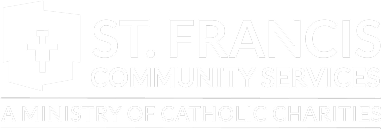St. Francis Community Service empowers low-income multicultural individuals and families to improve their lives.
In August, St. Francis Community Services, along with the Migrant and Immigrant Community Action (MICA) Project, the St. Louis Inter-Faith Committee on Latin America (IFCLA), and the Center for Growing Justice hosted our first Pro-Se Asylum Clinic. “Pro-se” refers to “in one’s own behalf,” describing that the person will represent themselves in immigration court. The goal for this clinic was to ensure all individuals are able to argue their cases in a meaningful way in immigration court, and to work with lawyers and volunteers to ensure paperwork is filled out correctly.
Expanding Access to Justice
Because legal representation is not guaranteed in Immigration Court, there is significantly more need for low-cost immigration representation than any one organization in the St. Louis region can provide. SFCS and the other pro bono legal providers receive so many calls each week for representation, and yet our organizations are not able to serve all of them. Facing Immigration Court without representation is detrimental for immigrants’ chances of success: unrepresented asylum seekers are significantly less likely to be granted asylum, by some estimates 3 times less likely. By organizing lawyers and volunteers to help determining arguments, take care of paperwork, and complete the filing process, this Pro-Se Clinic is part of a national effort to ensure that unrepresented immigrants are still able to present their asylum claims in court persuasively, and that they have a better chance of winning their case.
Recognizing the Role of Trauma in Asylum
An often under-recognized aspect of seeking asylum is the trauma inherent in the process. Seeking asylum includes telling and re-telling the violence and past trauma that has occurred in an individual’s country of origin in a court of law, typically without regard for how publicly telling stories of rape, killing of family members, or other types of persecution will affect the individual. During the Pro Se Clinic, many asylum-seekers completed affidavits describing the harm and persecution they experienced in their country of origin. Two of SFCS’ bilingual therapists, Martha Piñones and Evelyn Hernandez, volunteered the entire day to provide therapeutic support. Evelyn says, “As bilingual therapists, Martha and I were able to be present with clients to help manage stress in case they became overwhelmed while telling their stories. We also ran a check-in group session with clients at the end of the day to make sure they were stable before going home.”
Community Support
Hernandez also remarks, “It was important to see so many lawyers, interpreters, and other professionals volunteering for the Asylum Clinic.” Through the power of collaborative organizations and community volunteers, it is possible to expand access to justice even when the systems at large are acting against our immigrant neighbors. St. Francis Community Services is proud to work with MICA, IFCLA, and the Center for Growing Justice in order to support the rights of immigrants in the St. Louis region. With the help of over 40 volunteers and lawyers, the 17 individuals who attended the Asylum Clinic will now meet their filing deadlines.

